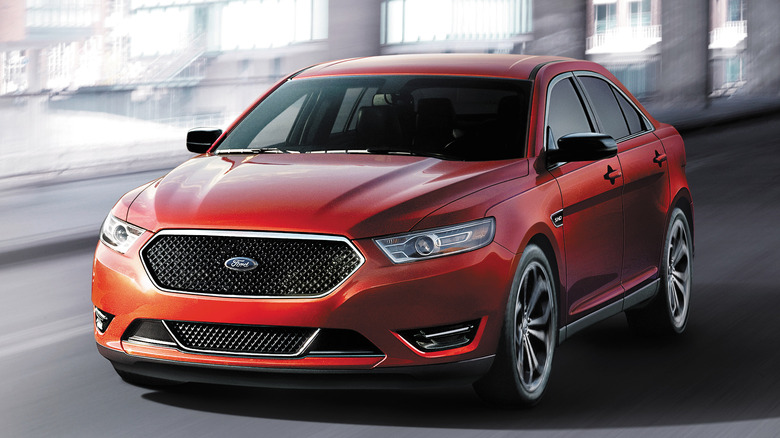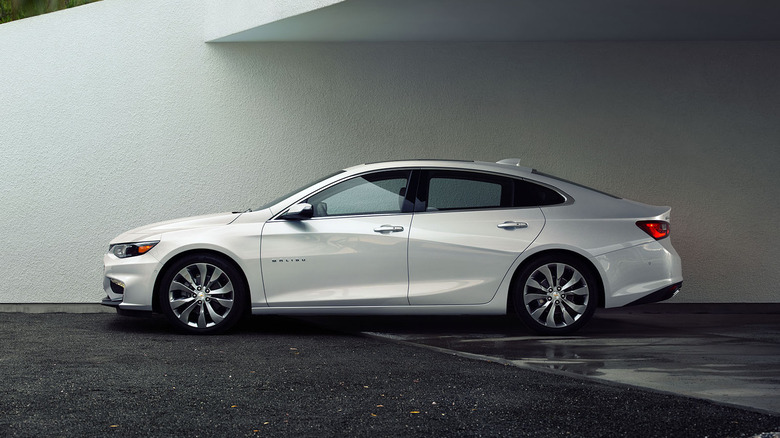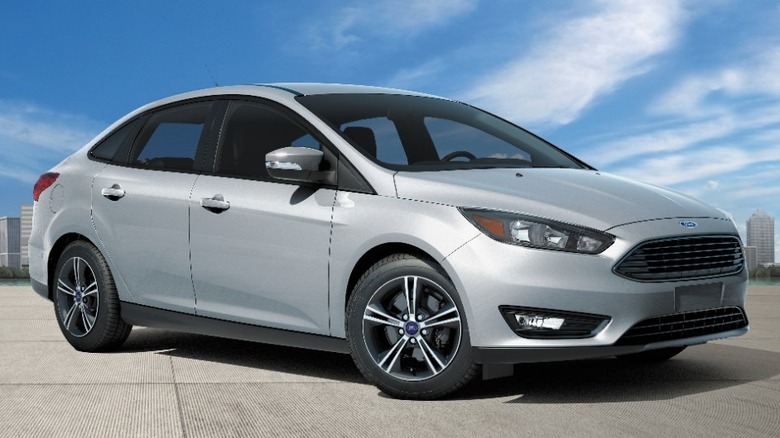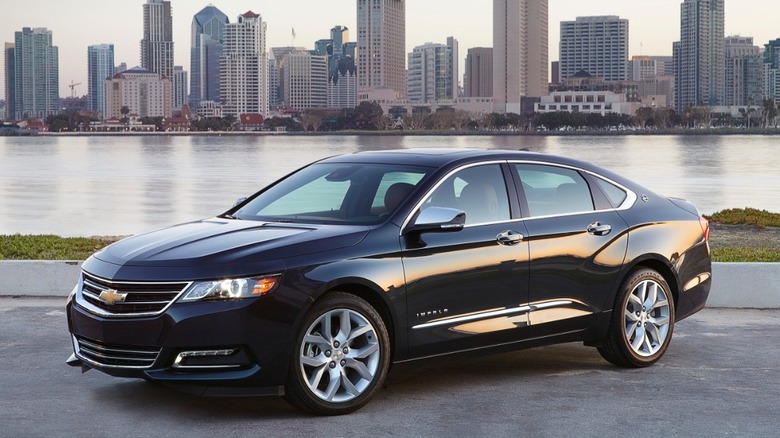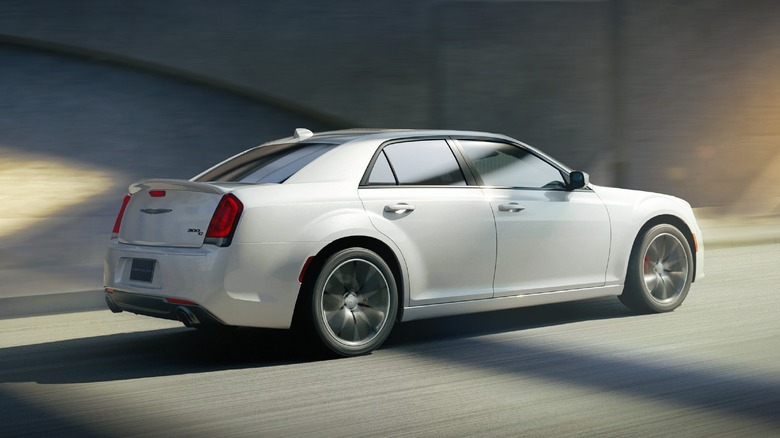Here's Why US Automakers Don't Sell Sedans Anymore
With the Chevy Malibu leaving GM's lineup, it marks the end of an automotive era for U.S. automakers. American sedans are a dying breed: At the end of 2024, Cadillac will be the only member of the Big Three (General Motors, Ford, and Chrysler) to offer a conventional four-door sedan. For automotive enthusiasts, this is likely sad news as the remaining options for purchase — crossover SUVs and trucks — don't exactly elicit the same excitement as something like a Dodge Charger or Ford Taurus SHO.
The remainder of the automotive purchasing world probably doesn't care as much, as it's more than happy to buy a Chevy Equinox or Ford Escape instead of a Ford Focus or Chevy Cruze. Automotive enthusiast tastes don't exactly reflect the wills and purchasing habits of an average buyer. As vocal as it is, the automotive enthusiast community (of which I, the author, am a part of) is too small of a demographic to ensure that big American automakers always have some sort of sedan or non-SUV offering.
More car for the money
Before you learn the reasons each specific company axed its sedans, why people actually buy cars needs to be explored. Necessity is the primary reason the vast majority of the public buys a car. You need one in the United States to get to work, to get groceries, or really do anything. You can manage without a car in some large cities, but if you live anywhere outside of a bus or subway route, you typically have to plunk down the cash for a car.
As hard it may be to do, put yourself into the mindset of someone who does not care about cars other than for practicality. You need something that fulfills your needs, so you go to a Chevy dealership nearby in this hypothetical scenario. Looking at Chevy's lineup, you take a look at the Malibu, as it's fairly inexpensive for what it is — and then you look at the Equinox, because the dealership likely has dozens on the lot.
The 2024 Chevy Malibu is priced at $25,100, and it has an advertised cargo capacity of 15.7 cubic feet. The 2024 Chevy Equinox is more expensive at a base MSRP of $26,600. It's a bit higher than the Malibu, yet it offers more cargo room at a maximum of 63.9 cubic feet. Will you use all that storage space? Maybe not, but the Equinox is "more car" for the money. To someone who doesn't care about driving fun or keeping a dying segment alive, the Equinox is almost a no-brainer. The same logic follows when buying a big truck, it's perceived as more vehicle for the money.
The perception of crossovers vs. sedans
Chevy isn't unique for offering an SUV that's outright better than a sedan. In 2018, which marked the last year of the Ford Focus, it had an MSRP of $17,950 for the base model. For someone who cares about how a car drives, this might be a good option, as it had a five-speed manual transmission as standard. Comparatively, the 2018 Ford Escape had a base MSRP of $23,940 and had an automatic transmission. The Ford Focus can squeeze 13.2 cubic feet of cargo into the interior, and the Ford Escape can fit a maximum of 68 cubic feet of stuff. Once again, the SUV is more car for the money.
Additionally, people buy cars for what they think they're going to do with them, as opposed to what they actually do. Our brains may tell us that we want to buy a Toyota Supra, Porsche 911, or a big muscle car because we want to race it, take it on a long road trip, or drive every curvy road in the state. That's perfectly fine to do, but how many times are we actually going to fulfill that dreamed purpose? Almost never. On the flip side, a non-car enthusiast might buy a Ford Escape because it seems like a good deal and it will fit more groceries/kids/etc than a slightly less expensive sedan.
While you probably aren't going to top the 200 mile per hour speedometer of a Dodge Challenger Hellcat anytime soon, the maximum cargo capacity of a poor Chevy Equinox will be tested often.
Sedans are being phased out
Personal preference and perception of value may be what gets someone to buy a car, but sales numbers are what ultimately drive a vehicle's longevity. Last year, General Motors sold 2.6 million vehicles across all of its brands. Over 1.8 million of that number was SUVs and trucks — just 130,000 Malibus sold in 2023. That's around five percent of total sales. It wouldn't make fiscal sense to dedicate the time, money, and effort to sell a vehicle that only accounts for essentially a rounding error's worth of sales. When you throw in GM's push towards electric vehicles, keeping the Malibu alive makes even less sense. That factory space can be better used towards more EVs.
GM was slow in killing off all of its sedans. The Impala, Malibu, Cruze, Sonic, as well as Buick's sedans died over the course of several years to make space for EV production, namely GM's Ultium platform. The Chevy Volt was also a casualty. Ford, on the other hand, was rather swift, taking out the Focus, Fiesta, and Taurus all within a few months of each other in 2018 after it announced that it was revamping its entire lineup in favor of SUVs and trucks.
Chrysler (part of Stellantis) is a little bit of a different story with the same ending. The Chrysler 300 and Dodge Charger were the only sedans across its brands in recent years, and those vehicles were phased out riding on a very old platform. All told, sedans are gone and SUVs like the Dodge Durango and Jeep's entire lineup is here to stay.
Customers like crossovers
Market forces, customer perception of value, and cold hard sales led the decision to kill sedans among the Big Three's lineups. It wasn't done out of spite or some other malevolent purpose. There isn't a global conspiracy to outlaw the four-door. If there was, the Honda Accord wouldn't exist. Sedans died among American brands because no one bought them for one reason or another, and the respective companies decided Malibus, 300s, Impalas, Tauruses, and others weren't worth producing anymore.
The Equinox, Escape, Silverado, Ram 1500, and F-150, however, are still worth investing in. Customers of the Big Three like to buy crossovers, SUVs, and trucks, so that's what the Big Three will give them. It's just business. Unless customers wildly change tastes and start buying sedans from other brands en masse, causing the Big Three to reverse course, it looks like crossovers the dominant force for now. You can either argue with the unstoppable tide of customer demand, or you can marvel at how long sedans lasted in the first place.
